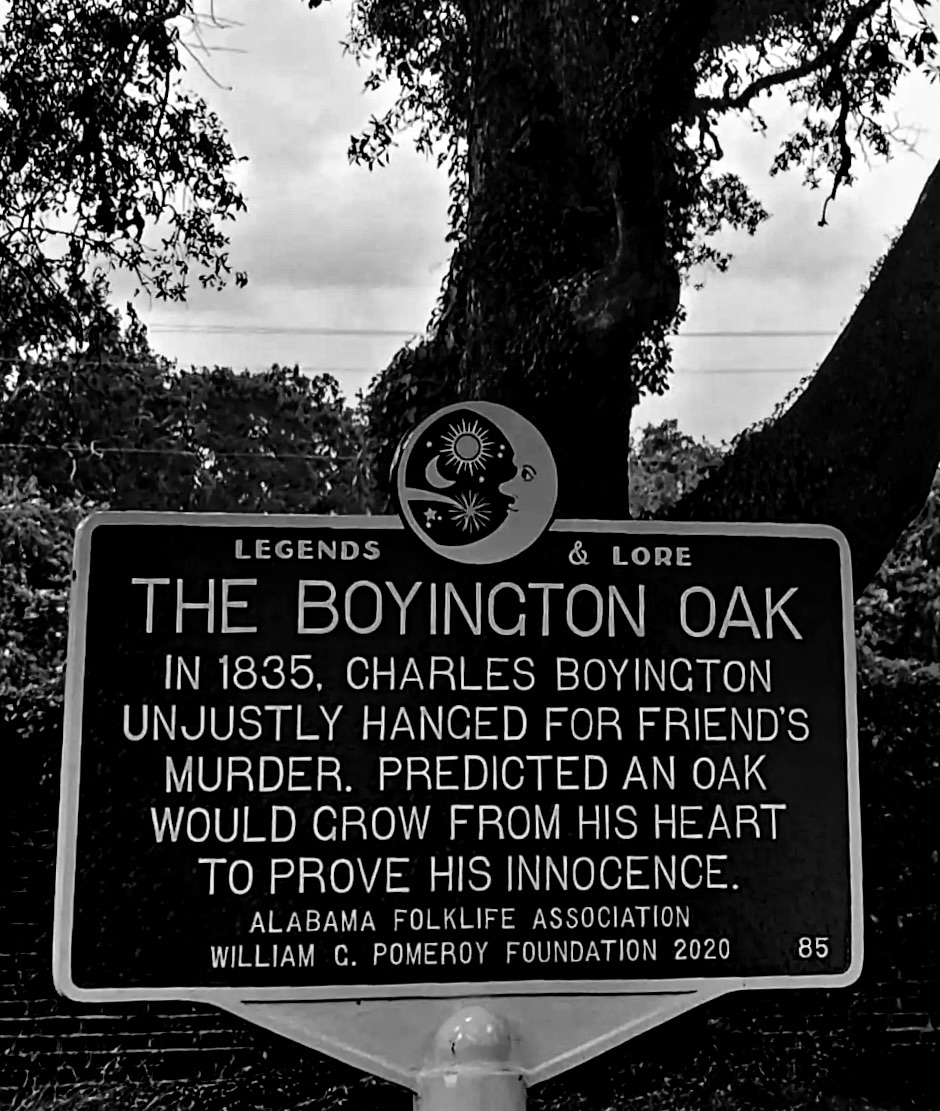Folks around Mobile, Alabama, will tell you there’s something peculiar about the old oak tree standing tall in Church Street Graveyard. Most folks walk right past it without a second thought, but those who know its story might pause, tip their hats, or give it a wide berth. They say that tree ain’t just any tree. No, sir. That’s the Boyington Oak, and it has a tale twisted as its gnarled roots—a tale of murder, a hanging, and a promise that grew into something far stranger than anyone could have imagined.
Back in 1834, there was a man named Charles Boyington, a drifter who came to Mobile looking to make his way in the world. Now, Charles wasn’t known for being well-to-do, and like most folks down on their luck, he fell in with the wrong crowd. Among his friends was Nathaniel Frost, another unlucky soul. Well, one May afternoon, Boyington and Frost went off together, as they often did, to enjoy a bit of fresh air. But when the sun set that evening, only Boyington came back. Frost was found dead beneath an old oak tree, his pockets turned out and empty.
It didn’t take long for folks to start whispering. Boyington had no money to speak of, and a man in his situation would do just about anything for a dollar or two. The authorities found Frost’s blood on Boyington’s knife, and that was enough for them. In those days, justice came quick. Boyington was thrown in jail, tried for murder, and sentenced to hang without much fuss.
Now, here’s where things get mighty strange. Boyington swore up and down he was innocent, said he hadn’t laid a finger on Frost. And as he stood there, knowing the rope was waiting for him, he made one final proclamation. “An oak tree will spring from my grave,” he said, loud enough for all to hear. “And when it does, it will be proof of my innocence.”
Well, people just shook their heads at that. A man about to meet the gallows would say just about anything, they figured. So, they hung Boyington in the cool of the morning, buried him in the old graveyard, and went on with their lives. The town moved on, and the story of Boyington faded, like the names on the worn tombstones out by the church.
But nature, it seems, wasn’t quite done with him.
Not long after they laid him in the ground, folks started to notice something peculiar. Right above Boyington’s grave, a small shoot had pushed through the earth. At first, no one paid it much mind—it was just a sprout, after all. But by the next year, that sprout had grown, and people began to recall what Boyington had said. “An oak tree will grow from my grave.” And sure enough, an oak it was.
Year by year, that tree grew taller and stronger, its roots twisting deep into the soil, wrapping around the bones of the man buried below. Some said it was just a coincidence, but others began to wonder if Boyington had been telling the truth after all. Maybe, just maybe, that tree was a sign—an omen planted by the hand of fate itself.
As the tree grew, so did the legend. People began to avoid the graveyard after dark, saying they’d seen strange shapes moving beneath the oak’s branches, heard whispers in the wind that didn’t belong to any living soul. They’d tell stories of hearing footsteps trailing behind them or catching a glimpse of a shadowy figure leaning against the tree, just like Boyington might’ve done in life. Some claimed that on stormy nights, the wind through the leaves sounded like a man’s voice, low and mournful, calling out for justice.
The tree stands there still, thick and twisted with age, its branches heavy with secrets. Old-timers say the oak is Boyington himself, reaching out from beyond the grave, determined not to be forgotten. There’s no proof of that, of course. But there’s no proof that he was guilty either, is there?
To this day, folks still wonder whether Boyington was truly the killer or if his words were a final act of defiance, a curse on the town that hung an innocent man. The truth, like the roots of that oak, is buried deep in the soil, tangled and hidden, just out of reach.
But if you ever find yourself wandering through Church Street Graveyard, and you happen to pass by that old oak, take a moment to listen. You might hear the rustle of leaves, or maybe—just maybe—you’ll hear the voice of a man wronged, still waiting for the world to set things right.

